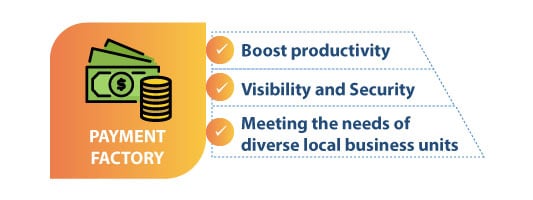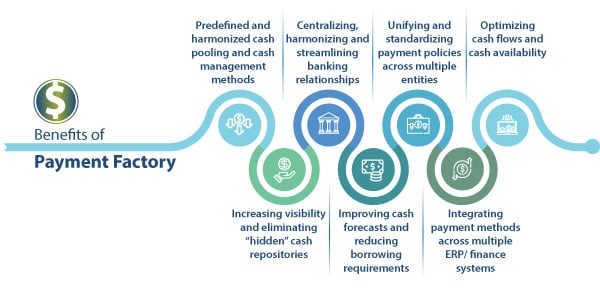Payment processing is a fundamental requirement within every company.
At the simplest level, all payments could be processed by a single business entity through one bank account and within the same ERP system. But in actual practice, that simple scenario has become very rare. Instead most companies today must grapple with relatively complex payment processing scenarios that involve multiple business units spread across several countries, with potentially hundreds of bank accounts used for disbursing payments at its most extreme.
For these companies, the use of a centralized Payment Factory can help cut through the complexity to boost productivity, visibility and security, while still meeting the needs of diverse local business units.

So, what is a Payment Factory? While there are varying approaches to the implementation details, most experts agree Payment Factory in general refers to a centralized hub that is set-up to control and manage processing of payment flows across multiple locations and/or business units.
Some of the key benefits of using a Payment Factory approach include:
- Predefined and harmonized cash pooling and cash management methods
- Centralizing, harmonizing and streamlining banking relationships
- Unifying and standardizing payment policies across multiple entities
- Optimizing cash flows and cash availability
- Increasing visibility and eliminating “hidden” cash repositories
- Improving cash forecasts and reducing borrowing requirements
- Integrating payment methods across multiple ERP/finance systems

Traditionally, payment factories have primarily focused on the payables function. However, as a result of regulatory pressures, the role of the treasurer is expanding into risk management and so the payment factory model must also evolve to be able to manage risk and assure compliance.
From a compliance standpoint, using a centralized Payment Factory enables comprehensive visibility to support enterprise-wide analytics and disclosure reporting while also retaining business unit granularity to manage local cash availability, process optimization and local reporting requirements.
Implementation of Payment Factory functions can be rolled out on an incremental basis if desired by bringing in only some targeted business units in the beginning and then expanding to include more as the program matures. However, to ensure a sustainable Payment Factory program over the long term, it is important to select a starting approach with a platform that integrates across diverse ERPs and can support a range of local country requirements.
Key features that should be considered for a comprehensive Payment Factory solution include:
- Ability to connect multiple banks using different payment standards and data formats
- Support for multiple ERPs and legacy finance systems
- Support for a variety of payment channels and formats including bank transfers, debit notes, checks, or specific local formats
- Mechanisms for inter-company clearing and settlement processes
- Standardized user interfaces across all business units, along with the ability to mimic legacy UI features if needed
- Integrated analytics for enterprise-wide visibility and reporting as well as drill-down, drill-through capabilities for local business unit transaction tracking and analysis
In summary, implementing enterprise-level Payment Factory functionality can offer major benefits in terms of cash and working capital optimization. The inherent risks associated with sub-optimal local cash repositories and non-uniform compliance methodologies can be minimized and overall cash flows can be optimized while still assuring needed autonomy and management for local business entities.
---------------------
For More Information: Watch this Video on Payment Factory

